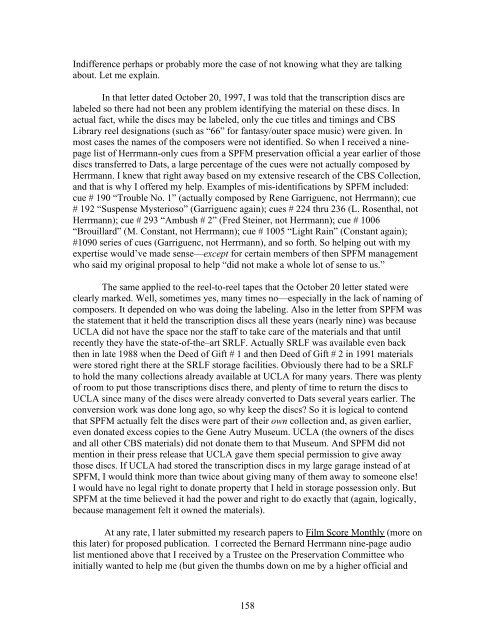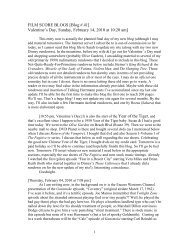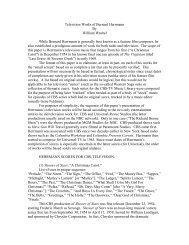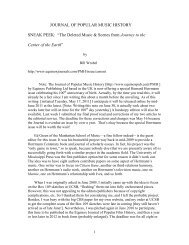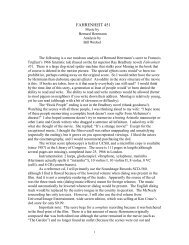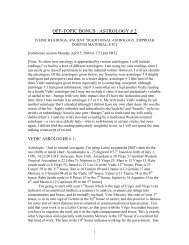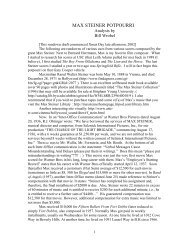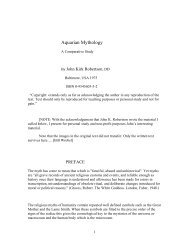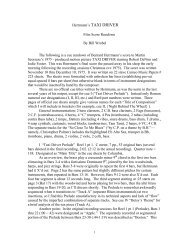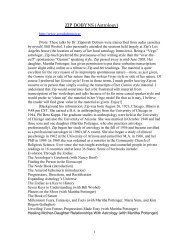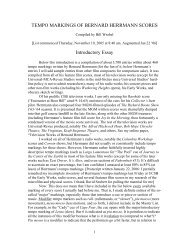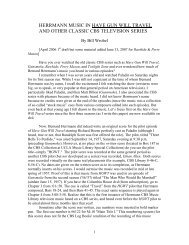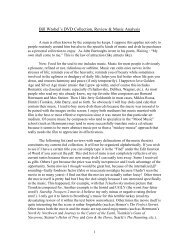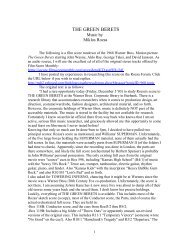CBS COLLECTION 072 UCLA - Film Score Rundowns
CBS COLLECTION 072 UCLA - Film Score Rundowns
CBS COLLECTION 072 UCLA - Film Score Rundowns
Create successful ePaper yourself
Turn your PDF publications into a flip-book with our unique Google optimized e-Paper software.
Indifference perhaps or probably more the case of not knowing what they are talking<br />
about. Let me explain.<br />
In that letter dated October 20, 1997, I was told that the transcription discs are<br />
labeled so there had not been any problem identifying the material on these discs. In<br />
actual fact, while the discs may be labeled, only the cue titles and timings and <strong>CBS</strong><br />
Library reel designations (such as “66” for fantasy/outer space music) were given. In<br />
most cases the names of the composers were not identified. So when I received a ninepage<br />
list of Herrmann-only cues from a SPFM preservation official a year earlier of those<br />
discs transferred to Dats, a large percentage of the cues were not actually composed by<br />
Herrmann. I knew that right away based on my extensive research of the <strong>CBS</strong> Collection,<br />
and that is why I offered my help. Examples of mis-identifications by SPFM included:<br />
cue # 190 “Trouble No. 1” (actually composed by Rene Garriguenc, not Herrmann); cue<br />
# 192 “Suspense Mysterioso” (Garriguenc again); cues # 224 thru 236 (L. Rosenthal, not<br />
Herrmann); cue # 293 “Ambush # 2” (Fred Steiner, not Herrmann); cue # 1006<br />
“Brouillard” (M. Constant, not Herrmann); cue # 1005 “Light Rain” (Constant again);<br />
#1090 series of cues (Garriguenc, not Herrmann), and so forth. So helping out with my<br />
expertise would’ve made sense—except for certain members of then SPFM management<br />
who said my original proposal to help “did not make a whole lot of sense to us.”<br />
The same applied to the reel-to-reel tapes that the October 20 letter stated were<br />
clearly marked. Well, sometimes yes, many times no—especially in the lack of naming of<br />
composers. It depended on who was doing the labeling. Also in the letter from SPFM was<br />
the statement that it held the transcription discs all these years (nearly nine) was because<br />
<strong>UCLA</strong> did not have the space nor the staff to take care of the materials and that until<br />
recently they have the state-of-the–art SRLF. Actually SRLF was available even back<br />
then in late 1988 when the Deed of Gift # 1 and then Deed of Gift # 2 in 1991 materials<br />
were stored right there at the SRLF storage facilities. Obviously there had to be a SRLF<br />
to hold the many collections already available at <strong>UCLA</strong> for many years. There was plenty<br />
of room to put those transcriptions discs there, and plenty of time to return the discs to<br />
<strong>UCLA</strong> since many of the discs were already converted to Dats several years earlier. The<br />
conversion work was done long ago, so why keep the discs? So it is logical to contend<br />
that SPFM actually felt the discs were part of their own collection and, as given earlier,<br />
even donated excess copies to the Gene Autry Museum. <strong>UCLA</strong> (the owners of the discs<br />
and all other <strong>CBS</strong> materials) did not donate them to that Museum. And SPFM did not<br />
mention in their press release that <strong>UCLA</strong> gave them special permission to give away<br />
those discs. If <strong>UCLA</strong> had stored the transcription discs in my large garage instead of at<br />
SPFM, I would think more than twice about giving many of them away to someone else!<br />
I would have no legal right to donate property that I held in storage possession only. But<br />
SPFM at the time believed it had the power and right to do exactly that (again, logically,<br />
because management felt it owned the materials).<br />
At any rate, I later submitted my research papers to <strong>Film</strong> <strong>Score</strong> Monthly (more on<br />
this later) for proposed publication. I corrected the Bernard Herrmann nine-page audio<br />
list mentioned above that I received by a Trustee on the Preservation Committee who<br />
initially wanted to help me (but given the thumbs down on me by a higher official and<br />
158


